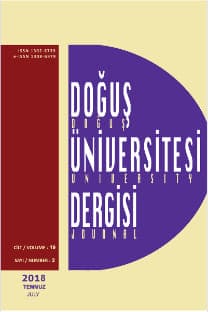ULUSLARARASI TEKNOLOJİ YAYILMASININ YENİLİK PERFORMANSI ÜZERİNE ETKİSİNDE SEKTÖREL TEKNOLOJİ YOĞUNLUĞUNUN BELİRLEYİCİ ROLÜ: TÜRK İMALAT SANAYİ ÜZERİNE AMPİRİK BİR UYGULAMA
Doğrudan Yabancı Yatırım, İhracat, Teknoloji Transferi, Yenilik Performansı, Sektörel Teknoloji Yoğunluğu
THE DECISIVE ROLE OF SECTORAL TECHNOLOGY INTENSITY IN THE IMPACT OF INTERNATIONAL TECHNOLOGY DIFFUSION ON INNOVATION PERFORMANCE: AN EMPIRICAL APPLICATION ON THE TURKISH MANUFACTURING INDUSTRY
Foreign Direct Investment, Export, Technology Transfer, Innovation Performance, Sectoral Technolohy Intensity,
___
- Arellano, M. ve Bover, O. (1995). "Another look at the instrumental variable estimation of error-components model", Journal of Econometrics, 68, 29-51.
- Avcı, M., Uysal, S. ve Taşcı, R. (2016). "Türk imalat sanayinin teknolojik yapısı üzerine bir değerlendirme", Sosyal ve Beşeri Bilimler Araştırmaları Dergisi, Yıl:1, 17(37), 49-66.
- Azman-Saini, W., Farhan, M., Tee, C.-L. ve Tun, Y.-L. (2018). "FDI inflows and R&D activity in developing countries", Int. Journal of Economics and Management, 12 (2), 509-521.
- Barro, R. J. ve Sala-i-Martin, X. X. (1997). "Technological diffusion, convergence, and growth", Journal of Economic Growth, 65, 1-46.
- Blundell, R. ve Bond, S. (2000). "GMM estimation with persistent panel data: an application to production functions", Journal of Econometric Reviews, 19 (3), 321-340.
- Branstetter, L. (2006). "Is foreign direct investment a channel of knowledge spillovers? Evidence from Japan’s FDI in theUnited States", Journal of International Economics, 68, 325–344.
- Cohen, W. M. ve Levinthal, D. A. (1989). "Absorptive capacity: a new perspective on learning and innovation", Administrative Science Quarterly, 35(1), 128-152.
- Dunning, J. H. (1988). "The theory of international production", The International Trade Journal, 3(1), 21-66.
- Escribano, A., Fosfuri, A. ve Tribo, J. A. (2005). "Managing knowledge spillovers:the impact of absorptive capacity on innovation performance", Working Papers, EARIE Conference, Porto, 1-30.
- Eşiyok, A. (2013). "Türkiye imalat sanayinin teknolojik yapısı: sürdürülebilir mi?", İktisat ve Toplum Dergisi, Yıl:2, 1(31-32), 1-9.
- Eurostat. (2019, 19 Aralık). European commission: Erişim Adresi https://ec.europa.eu/eurostat/web/structural-business-statistics/structural-business-statistics/sme.
- Ferragina, A. M. ve Mazzotta, F. (2013). "FDI spillovers on firm survival in Italy: absorptive capacity matters!", J Technol Transf , 39(1), 859–897.
- Goya, E., Vaya, E. ve Surinach, J. (2015). "Innovation spillovers and firm performance: micro evidence from Spain (2004–2009)", J Prod Anal, 45(1), 1–22.
- Grossman, G. M. ve Helpman, E. (1991). "Trade, knowledge spillovers, and growth", European Economic Review, 35(3), 517-526.
- Gürlesel, C. F. (2009). "Global sanayi eğilimleri ve Türkiye için değerlendirme", İstanbul Sanayi Odası Yayınları, No:2009/2, 1-199.
- Hsu, J. ve Chuang, Y.-P. (2014). "International technology spillovers and innovation: Evidence from Taiwanese high-tech firms", The Journal of International Trade & Economic Development, 23 (3), 387-401.
- Keller, W. (2004)." International technology diffusion", Journal of Economic Literature, 92 , 752-782.
- Küçükkiremitçi, O. (2011). "Türkiye sanayi stratejisi belgesi temelinde imalat sanayinin yapısal analizi", Memleket Siyaset Yönetim Dergisi, 1(5), 53-94.
- Lenger, A. ve Taymaz, E. (2006). To innovate or to transfer? a study on spillovers and foreign firms in Turkey. J Evol Econ, 16(1), 137–153.
- Li, X. (2011). "Sources of external technology, absorptive capacity, and innovation capability in Chinese state-owned high-tech enterprises", World Development, 39(7), 1240-1248.
- Liu, X. ve Buck, T. (2007). "Innovation performance and channels for international technology spillovers: evidence from chinese high-tech industries", Research Policy, 36(1), 355-366.
- McGregor, N. F., Pösch, J. ve Stehre, R. (2017). "The importance of absorptive capacities: productivity effects of international R&D spillovers through intermediate inputs", Economics of Innovation and New Technology, 26(8), 719-733.
- Oh, C., Cho, Y. ve Kim, W. (2015). "The effect of a firm's strategic innovation decisions on its market performance", Technology Analysis & Strategic Management, 27(1), 39-53.
- Romer, P. M. (1990). "Endogenous technical change", Journal of Political Economy, 71-102.
- Salomon, R. M. ve Shaver, M. J. (2005). "Learning by exporting: new insights from examining firm innovation", Journal of Economics and Management Strategy, 14(2), 431–460.
- Schumpeter, J. A. (1942). Capitalism, socialism and democracy. New York (2014): Routledge, Taylor& Francis Group.
- Segarrra, A. ve Teruel, M. (2011). "Productivity and R&D sources: evidence for Catalan firms", Economics of Innovation and New Technology, 20(8), 727-748.
- Seyidoğlu, H. (1998). Uluslararası İktisat, Teori, Politika ve Uygulama. İstanbul, Türkiye: Güzem Yayınları No:14.
- Shefer, D. ve Frenkel, A. (1998). "Local milieu and innovations: some emprical results", The Annals of Regional Science, 32(5), 185-200.
- Taymaz, E. ve Lenger, A. (2004). "Multinational corporations as a vehicle for productivity spillovers in Turkey", Danish Report Unit for Industrial Dinamics (DRUID) Working Paper, September, 1-30.
- TÜİK. (2017). Sanayi ve hizmet istatistikleri anketi/Ar-Ge anketi/yenilik anketi. Ankara: Türkiye İstatistik Kurumu.
- Üçdoğruk, Y. (2010 ). "Modelling R&D investment decision of ISE listed firms: a sample selection approach", İktisat İşletme ve Finans, 25(289), 29-45.
- Wang, Y. ve Li-Ying, J. (2015). "Licensing foreign technology and the moderating role of local R&D collaboration: extending the relational view", J Prod Innov Manag, 32(6), 997–1013 .
- Zahra, S. A. ve George, G. (2002). "Absorptive capacity: a review, reconceptualization, and extension", Academy of Management Review, 27(2), 185-203.
- ISSN: 1302-6739
- Yayın Aralığı: 2
- Başlangıç: 2000
- Yayıncı: Doğuş Üniversitesi
İSTİHDAM, GÜVEN ENDEKSİ VE MALİYET ENDEKSİ İLİŞKİSİ: TÜRKİYE İNŞAAT SEKTÖRÜ İÇİN BİR UYGULAMA
AKILLI LİMANLAR ÜZERİNE BİBLİYOMETRİK BİR LİTERATÜR ARAŞTIRMASI
BİLGİ PAYLAŞIMI, ÖZÜMSEME KAPASİTESİ, TEDARİK ZİNCİRİ YENİLİKÇİLİĞİ VE PERFORMANSI ARASINDAKİ İLİŞKİ
Salih Zeki İMAMOĞLU, Hülya TÜRKCAN, Kağan DEMİRCİ
TÜKETİCİLERE YÖNELİK ETİK DIŞI FİYATLAMA UYGULAMALARI
Murat Selim SELVİ, Neslihan CAVLAK
Osman Seray ÖZKAN, Burcu ÜZÜM, Yasemin GÜLBAHAR
TERSİNE LOJİSTİK UYGULAMALARININ TÜKETİCİ BAKIŞ AÇISINDAN DEĞERLENDİRİLMESİ
Süleyman Can YILDIRIR, Zafer SAYAN
ÖRGÜTSEL ADALET İLE YARATICILIK İLİŞKİSİNDE ROL ÇATIŞMASI VE ROL BELİRSİZLİĞİNİN DÜZENLEYİCİ ROLÜ
